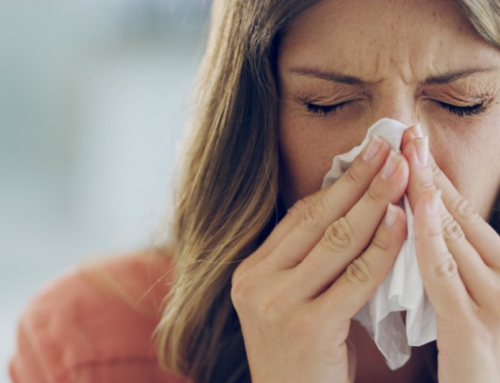Milliyet Newspaper – April 5, 2021
The coronavirus has affected our lives a lot. Many people have died from the coronavirus so far. With the discovery of new vaccines, we have hope. With the implementation of the Biontech vaccine in our country, especially people with allergic diseases are confused about which vaccine to choose. With the reporting of cases of serious allergic reactions to vaccines, those with allergic diseases are worried. President of the Allergy and Asthma Society Prof. Dr. Ahmet Akçay gave information about which vaccine should be preferred by allergy sufferers.
- What is Germany's Pfizer BioNTec Vaccine and China's Coronavac Vaccine?
- How Effective Are Vaccines?
- What Are the Side Effects of Vaccines?
- What Are the Allergy Risks of Vaccines?
- Which Vaccine Should Those With Allergic Diseases Get?
- Can Those With Drug Allergies Have The BioNTech Coronavirus Vaccine?
- Can Allergy Develops Against Vaccine With Pre-Vaccin Allergy Test?
- How Do I Know If I Have Developed A Vaccine-induced Allergic Shock?
What is Germany’s Pfizer BioNTec Vaccine and China’s Coronavac Vaccine?
Germany’s Pfizer BioNTech vaccine is an mRNA-based COVID 19 vaccine. The other mRNA vaccine is the Moderna vaccine. BioNTech technology for the BNT162b2 vaccine is based on the use of nucleoside modified mRNA (modRNA) that encodes a portion of the spike protein found on the surface of the SARS-CoV-2 coronavirus (COVID 19). In this vaccine, a part of the spike protein is formed in the body by the mRNA, which creates immunity in the body. This immunity provides protection against infection.
Coronavac vaccine of China’s Sinovac company is a dead vaccine inactivated with formaldehyde and aluminum is used as an adjuvant. The virus is disintegrated and neutralized, stimulating our immunity without interruption to our body. It is considered to be safer because it is a dead vaccine.
How Effective Are Vaccines?
The efficiency rate announced by the company officials for the BioNTech vaccine has been reported as 91.3%. The effectiveness rate of the Coronavac vaccine has been reported as 83% according to the data in Turkey. It has been reported that the vaccine is 100% effective in protecting against severe and moderate infections. The efficacy rates of both vaccines seem close to each other.
What Are the Side Effects of Vaccines?
Pfizer-Biontech COVID-19 vaccine side effects are similar to other adult vaccines. During clinical trials, side effects, in order of frequency that are considered very common, are:
-Pain and swelling at the injection site,
-Tiredness,
-Headache,
-Muscle pains,
-Shake,
-Joint pain and fever. Fever is more common after the second dose.
The most common side effect of the Coronavac vaccine was pain at the injection site, with a rate of 17%. This pain was generally mild and resolved within 48 hours. Other side effects seen; swelling, redness, fatigue, mild fever, chills, headache, muscle, joint pain, vomiting and diarrhea in the vaccination area. These symptoms may appear within a week after vaccination. No fatal reaction has been reported so far.
What Are the Allergy Risks of Vaccines?
Allergic reactions to vaccines are usually due to additives and components in the vaccine, such as preservatives and antibiotics, rather than the active ingredient itself. Vaccines may also contain small amounts of protein, depending on the manufacturing process.
For the BioNTech vaccine, severe allergic reactions have been observed in approximately eleven cases per million doses of vaccine. According to a report from the US Centers for Disease Control and Prevention, 71% of these allergic reactions developed within 15 minutes of vaccination and mostly (81%) occurred in people with a history of an allergy or allergic reaction.
It is thought that the cause of allergic reactions to the vaccine may be due to the polyethylene glycol (PEG) substance used to prevent the degradation of mRNA in the BioNTech vaccine and to allow it to dissolve in water. It is also thought that mRNA itself can cause allergies. Although the cause of the allergy is thought to be related to the PEG substance or mRNA substance, this has not been clearly demonstrated in scientific publications. In a newly published article, in the follow-up of 4 cases reported as allergic shock, it was reported that this condition was not allergic shock, but cases mimicking allergic shock.
No significant allergic reactions have generally been reported for the Coronavac vaccine. There is a risk of allergic rash and allergic shock, albeit rare, as with any vaccine. Although there is no risky vaccine in drug allergies like Germany’s vaccine, it can still be said that there is no risk of allergy. Adrenaline medication is kept ready against the risk of allergy in health institutions where vaccination is given. The resulting data are reports of a small number of vaccine applications. Since the polyethylene glycol substance in BioNTech’s vaccine is not included in this vaccine, it can be said that the risk of allergy development is less. The Chinese vaccine does not contain any preservatives. The vaccine contains disodium hydrogen phosphate, aluminum hydroxide, sodium dihydrogen phosphate, sodium chloride as excipients. Those with a history of allergy to these substances should not be vaccinated.
Which Vaccine Should Those With Allergic Diseases Get?
It is okay for people with allergic asthma, eczema, allergic rhinitis and other allergic diseases to have both BioNTech and the Chinese vaccine Coronavac vaccine.
It would be beneficial for only those with allergic diseases to have their vaccinations in the hospital environment and to wait under observation for 30 minutes after vaccination. The BioNTech vaccine has a higher risk of allergies for those with drug allergies and allergies to food additives. For this reason, it may be safer for those who have had an allergic reaction to the tablet form of the drugs, those whose drug allergy has not been determined, and those who are allergic to food additives, to receive the Chinese vaccine Coronavac vaccine instead of the BioNTech vaccine in terms of allergy risk. Classifying vaccines as low, medium and high in terms of allergy development potential may be helpful in deciding on vaccine selection.
Allergic diseases with a low risk of developing allergy to coronavirus vaccines are as follows:
– Having allergic diseases in the family,
Those with asthma, allergic rhinitis and eye allergies due to respiratory allergies such as house dust mite, pollen, mold,
– Those with food allergies,
– Those with eczema (atopic dermatitis),
– Those who have an allergy vaccine,
– Those who take biological treatment such as anti IgE, anti IL-5 due to asthma,
Those who are allergic to pain relievers such as salicylic acid, ibuprofen,
– Those who are allergic to certain drugs and bee venom before,
-Those who have developed swelling at the vaccination site in previous vaccinations.
It is okay for those with the above-mentioned allergic disease to have every vaccine, and it will be sufficient to wait for 15-30 minutes under surveillance in the hospital environment after the vaccination. There is no harm in administering BioNTech and Coronavac vaccines to those who have a low risk of developing allergy to vaccines.
Allergic diseases with a moderate risk of developing allergies to coronavirus vaccines include:
– Those who are allergic to drugs and the cause of drug allergy cannot be determined, but if severe allergy or allergic shock has developed against drugs (there may be a PEG allergy),
Those who have previously developed an allergic reaction to vaccines and monoclonal antibodies such as omalizumab,
– Those with mast cell disease such as systemic mastocytosis.
In these cases, there is a risk of PEG allergy and should be examined by allergy specialists for PEG allergy. If the vaccine is to be administered, it should be waited for 30 minutes after the vaccination under the supervision of the hospital. There is no information yet on whether it would be beneficial to use antihistamines to prevent the development of allergic reactions before treatment. The use of antihistamines before treatment may hide the first signs of allergic shock. Therefore, it is difficult to make a decision about the use of antihistamines before each vaccine. Those with a moderate risk of allergy may be advised to choose the vaccine in the direction of the Chinese vaccine Coronavac.
If an allergic reaction has developed to the previously mRNA vaccines, Pfizer BioNTech vaccine, or China’s Coronavac vaccine, the second dose of the vaccine should not be administered.
Can Those With Drug Allergies Have The BioNTech Coronavirus Vaccine?
There have been cases of allergic reactions to the BioNTech and other mRNA vaccine, the Moderna vaccine. Since it is thought that the cause of allergy to these vaccines may be related to the PEG substance, which is the preservative in the vaccine, it will be safer for those who are allergic to PEG-containing drugs not to have the BioNTech vaccine. If the cause of drug allergy is not due to a drug containing PEG, then the risk of developing an allergy will not be high. If you do not know whether the cause of your drug allergy is due to the PEG substance, it may be more accurate to take the Chinese vaccine Coronavac.
Can Allergy Develops Against Vaccine With Pre-Vaccin Allergy Test?
Allergy tests against PEG can be performed to predict the risk of allergy before vaccination. However, there is not enough data yet for these tests to predict the risk of allergy to the vaccine. It will be more accurate to say more clearly with the publication of studies on allergy tests in the coming days.
How Do I Know If I Have Developed A Vaccine-induced Allergic Shock?
Allergic shock most commonly affects the skin, heart and circulatory and respiratory systems. In the case of allergic shock, the following symptoms may occur:
– Skin rash, redness, itching,
– Swelling of the tongue and lips,
Hoarseness as a result of swelling in the larynx and narrowing of the bronchi,
– Shortness of breath and asthma,
– A decrease in blood pressure as a result of affecting the heart circulation,
-Fast heart beat
– As a result of fainting and involvement of the digestive system, abdominal pain symptoms in the form of vomiting and cramps occur.
An important information to keep in mind is that allergic shock can develop without skin manifestations. This is especially true in older ages. Care should be taken for early signs of allergic shock after vaccination. If symptoms such as tickling in the throat, cough, cold, sneezing, dizziness, and abdominal pain developed within 30 minutes after vaccination, it would be beneficial to inform the health personnel.






